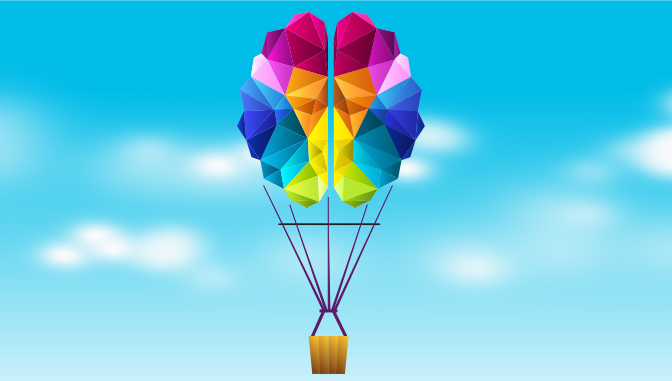You’re More Creative Than You Think

For all its artsy, free-flowing connotations, “creativity” can be a little intimidating, especially when it comes to the workplace. In recent years, it’s become hard not to notice the word has grown into a trendy, business world, catch-all concept with experts touting the “creative economy,” “creative consultants” popping up all over the place, and people increasingly titling themselves “a creative” on their resumes.
Creative thinking and fostering a creative office atmosphere are becoming increasingly valued in the workplace — and for good reason. Creativity fuels innovation, innovation solves problems, and problem solving is a skill highly prized by employers. Not only can creativity help you be more successful at the job you already have, it can help you land that dream job as well.
Creativity is considered a “soft skill.” Soft skills, like time management, flexibility, and empathy, are personal attributes that relate to how well you work with other people. In comparison, hard skills are learned, measurable, technical abilities. In early 2019, the professional networking site LinkedIn looked at thousands of job postings and ranked the most sought-after hard and soft skills employers were seeking. Predictably, “cloud computing” and “artificial intelligence” were the top-rated hard skills, but the most in-demand soft skill was something a little more human: creativity!
Creativity is often mistakenly equated with having an artistic talent, like design or music, so you could be forgiven for thinking that calling yourself a creative person is a privilege reserved for those who work in offices with free soda, neon furniture, and scooters in the hallways. The truth is, you can be a creative thinker no matter what field you work in or the color of your office. Productive creativity is agile, resourceful, persistent, and not afraid of the unconventional. Does that sound like you? Then you’re probably more creative than you think. While we’re all born with an innate imagination and curiosity, that doesn’t mean that creativity doesn’t take a little work, especially for those of us who haven’t been challenged to think creatively before.
So how do you “do” creativity? It’s possible to practice and strengthen your creativity just like you would with any other skill.
While it may seem counterintuitive, creativity can actually thrive with a little structure. Putting constraints, either real or imaginary, around your brainstorming sessions forces you to find different solutions to problems and approach even ordinary tasks in new ways. A good way to get started is to run some thought experiments. For example, imagine you had $100,000 to spend on improvements to your company. How would you spend it? Or, try taking an everyday object and thinking of a new way to use it. If you’ve ever seen a child play, they’ll spin random games and stories out of seemingly nothing. They’ll forget about the new toy and instead play with the box it came in. Unplug and let yourself be bored, with no distractions, and you’ll be surprised at what you can come up with all by yourself. Think like a kid again and use what’s already around you to be inspired.
Don’t expect every idea to be great. In fact, expect a lot of them won’t be, but remember that nothing kills creativity faster that criticism. So, if you’re trying to think more open-endedly or are encouraging others to do the same, allow for some safe, “no comment” space to throw out ideas. There will be time to pick out the best bits and delve into details later, so keep things judgment-free to give your creativity space to roam unencumbered.
Everyone works differently, but in general, creativity doesn’t like a vacuum. Talking to and working with a variety of people with different perspectives encourages sharing and idea creation. If you’re leading a team, the more diversity present usually makes for a more creative group. Find a trusted colleague or friend to bounce ideas off of and you’ll be surprised what a difference a second or third pair of eyes and ears makes.
Still feeling stuck? Take a break and do something else that allows your mind to wander. Take a walk, get out of your chair, doodle. Take up a hobby outside of work and try something completely different than what you’re used to. If you work with your hands, try something that involves being still and exercising your imagination. If you sit at a computer all day, try something active. After all, sometimes your most creative ideas can happen when you least expect them to.


